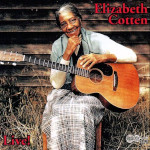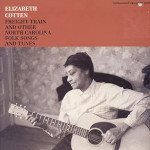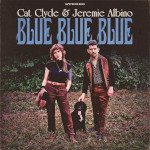

Elizabeth "Libba" Cotten (née Nevills) (January 5, 1893 – June 29, 1987) was an American blues and folk musician, singer, and songwriter.
A self-taught left-handed guitarist, Cotten developed her own original style. She played a guitar strung for a right-handed player, but played it upside down, as she was left-handed. This position meant that she would play the bass lines with her fingers and the melody with her thumb. Her signature alternating bass style has become known as "Cotten picking".
Cotten was born in 1893 to a musical family near Chapel Hill, North Carolina, in an area that would later be incorporated as Carrboro. Her parents were George Nevill (also spelled Nevills) and Louisa (or Louise) Price Nevill. Elizabeth was the youngest of five children. She named herself on her first day of school, when the teacher asked her name, because at home she was only called "Li'l Sis." By the age of 8, she was playing songs. At age 9, she was forced to quit school and began work as a domestic. At the age of 12, she had a live-in job at Chapel Hill. She earned a dollar a month, that her mother saved up to buy her first guitar. The guitar, a Sears and Roebuck brand instrument, cost $3.75 (equivalent to $108 in 2020). Although self-taught, she became proficient at playing the instrument, and her repertoire included a large number of rags and dance tunes.
By her early teens, she was writing her own songs, one of which, "Freight Train", became one of her most recognized. She wrote the song in remembrance of a nearby train that she could hear from her childhood home. The 1956 UK recording of the song by Chas McDevitt and Nancy Whiskey was a major hit and is credited as one of the main influences on the rise of skiffle in the UK.
Around the age of 13, Cotten began working as a maid along with her mother. On November 7, 1910, at the age of 17, she married Frank Cotten. The couple had a daughter, Lillie, and soon after Elizabeth gave up guitar playing for family and church. Elizabeth, Frank and their daughter Lillie moved around the eastern United States for a number of years, between North Carolina, New York City, and Washington, D.C., finally settling in the D.C. area. When Lillie married, Elizabeth divorced Frank and moved in with her daughter and her family.
Cotten retired from playing the guitar for 25 years, except for occasional church performances. She did not begin performing publicly and recording until she was in her 60s. She was discovered by the folk-singing Seeger family while she was working for them as a housekeeper.
While working briefly in a department store, Cotten helped a child wandering through the aisles find her mother. The child was Peggy Seeger, and the mother was the composer Ruth Crawford Seeger. Soon after this, Cotten again began working as a maid, this time for Ruth Crawford Seeger and Charles Seeger and caring for their children, Mike, Peggy, Barbara, and Penny. While working with the Seegers (a voraciously musical family that included Pete Seeger, a son of Charles from a previous marriage), she remembered her own guitar playing from 40 years prior and picked up the instrument again and relearned to play it, almost from scratch.
In the later half of the 1950s, Mike Seeger began making bedroom reel-to-reel recordings of Cotten's songs in her house. These recordings later became the album Folksongs and Instrumentals with Guitar, which was released by Folkways Records. Since the release of that album, her songs, especially her signature song, "Freight Train" — which she wrote when she was a teenager — have been covered by Peter, Paul, and Mary, Jerry Garcia, Bob Dylan, Joe Dassin, Joan Baez, Devendra Banhart, Laura Gibson, Laura Veirs, His Name Is Alive, Doc Watson, Taj Mahal, Geoff Farina, and Country Teasers.

Peggy Seeger took the song "Freight Train" with her to England, where it became popular in folk music circles. British songwriters Paul James and Fred Williams subsequently misappropriated it as their own composition and copyrighted it. Under their credit, it was then recorded by British skiffle singer Chas McDevitt, who recorded the song in December, 1956. Under advice from his manager (Bill Varley), McDevitt then brought in folk-singer Nancy Whiskey and re-recorded the song with her doing the vocal; the result was a chart hit. McDevitt's version influenced many young skiffle groups of the day, including The Quarrymen. Under the advocacy of the influential Seeger family, the copyright was eventually restored to Cotten. Nevertheless, it remains mis-credited in many sources.
Shortly after that first album, she began playing concerts with Mike Seeger, the first of which was in 1960 at Swarthmore College.
In the early 1960s, Cotten went on to play concerts with some of the big names in the burgeoning folk revival. Some of these included Mississippi John Hurt, John Lee Hooker, and Muddy Waters at venues such as the Newport Folk Festival and the Smithsonian Festival of American Folklife.
The newfound interest in her work inspired her to write more songs to perform, and in 1967 she released a record created with her grandchildren, which took its name from one of her songs, "Shake Sugaree". The song featured 12-year-old Brenda Joyce Evans, Cotten's great-grandchild, and future Undisputed Truth singer.
Using profits from her touring, record releases and awards given to her for her own contributions to the folk arts, Cotten was able to move with her daughter and grandchildren from Washington, D.C., and buy a house in Syracuse, New York. She was also able to continue touring and releasing records well into her 80s. In 1984, she won the Grammy Award for Best Ethnic or Traditional Recording, for the album Elizabeth Cotten Live, released by Arhoolie Records. When accepting the award in Los Angeles, her comment was, "Thank you. I only wish I had my guitar so I could play a song for you all." In 1989, Cotten was one of 75 influential African-American women included in the photo documentary I Dream a World>.
Cotten died in June 1987, at Crouse-Irving Hospital in Syracuse, New York, at the age of 94.
Cotten began writing music while toying with her older brother's banjo. She was left-handed, so she played the banjo in reverse position. Later, when she transferred her songs to the guitar, she formed a unique style, since on a 5-string banjo the uppermost string is not a bass string, but a short, high-pitched string which ends at the fifth fret. This required her to adopt a unique style for the guitar. She first played with the "all finger down strokes" like a banjo. Later, her playing evolved into a unique style of fingerpicking. Her signature alternating bass style is now known as "Cotten picking". Her fingerpicking techniques have influenced many other musicians.

"Freight Train" is an American folk song written by Elizabeth Cotten in the early 20th century, and popularized during the American folk revival and British skiffle period of the 1950s and 1960s. By Cotten's own account in the 1985 BBC series Down Home, she composed “Freight Train” as a teenager (sometime between 1906 and 1912), inspired by the sound of the trains rolling in on the tracks near her home in North Carolina.
Cotten was a one-time nanny for folk singer Peggy Seeger, who took this song with her to England, where it became popular in folk music circles. British songwriters Paul James and Fred Williams subsequently misappropriated it as their own composition and copyrighted it. Under their credit, it was then recorded by British skiffle singer Chas McDevitt, who recorded the song in December, 1956. Under advice from his manager (Bill Varley), McDevitt then brought in folk-singer Nancy Whiskey and re-recorded the song with her doing the vocal; the result was a chart hit. McDevitt's version influenced many young skiffle groups of the day, including The Quarrymen. Under the advocacy of the influential Seeger family, the copyright was eventually restored to Cotten. Nevertheless, it remains mis-credited in many sources.
The Elizabeth Cotten recording for the Folksongs and Instrumentals with Guitar album was made by Mike Seeger in late 1957, early 1958, at Cotten's home in Washington, D.C. Ramblin' Jack Elliott recorded this song in 1957. It is included on the CD, The Lost Topic Tapes: Cowes Harbour 1957.
Many artists have since recorded their own version of the song, including


Text is available under the Creative Commons Attribution-ShareAlike License.
Date: June 2021.
Photo Credits:
(1),(2),(4) Elizabeth Cotten,
(3) Amythyst Kiah,
(5) Peggy Seeger,
(6) Cat Clyde & Jeremie Albino
(unknown/website).